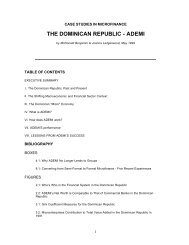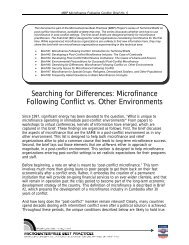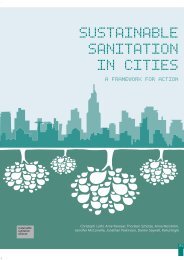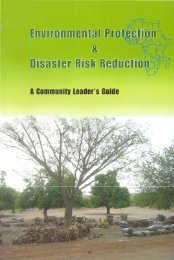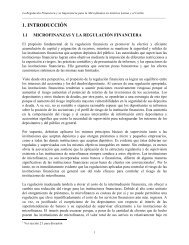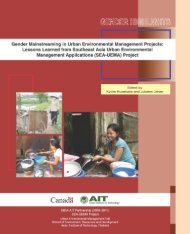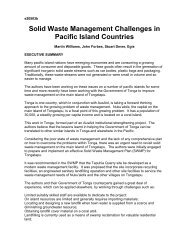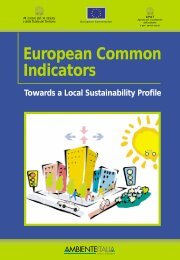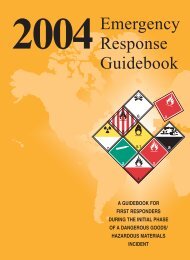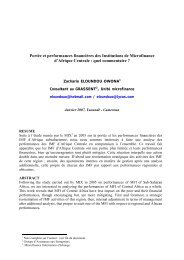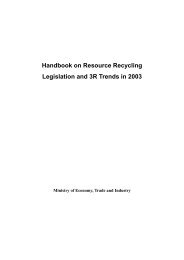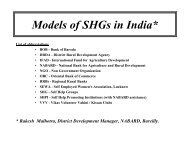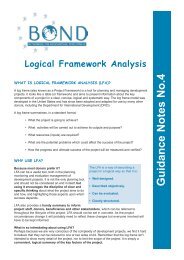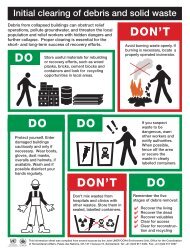The International Implementation Scheme (IIS) - Unesco
The International Implementation Scheme (IIS) - Unesco
The International Implementation Scheme (IIS) - Unesco
Create successful ePaper yourself
Turn your PDF publications into a flip-book with our unique Google optimized e-Paper software.
DESD <strong>International</strong> <strong>Implementation</strong> <strong>Scheme</strong> (<strong>IIS</strong>)<br />
those of the UN Literacy Decade, will contribute crucially to the panoply of efforts of ESD.<br />
Conversely, the DESD will give an increasing place to issues of sustainable development in<br />
UNGEI discourse and initiatives.<br />
• <strong>The</strong> United Nations Environment Programme (UNEP) will be a key partner in defining and<br />
promoting the environmental perspectives of ESD and in coordinating environmental<br />
lobbying. It is also well placed to access networks and alliances of environmental<br />
organisations at all levels and to strengthen their educational role. Under the banner of<br />
‘Environment for Development’, UNEP’s existing range of environmental education<br />
initiatives should form part of the Decade’s thrust and, as far as possible, be broadened to<br />
include sustainable development perspectives.<br />
• <strong>The</strong> UN Habitat Initiative ‘Best Practices and Local Leadership Programme (BLP)’ is a<br />
global network of institutions dedicated to the identification and exchange of successful<br />
solutions for sustainable development. To date, this global network is applying lessons<br />
learned from more than 1600 documented policies and practices from 140 countries,<br />
providing unique empirical evidence of how cities and communities around the world are<br />
contributing to meeting the MDG. Currently UN Habitat has about 300 good and best<br />
practices dealing with education. <strong>The</strong> BLP programme promotes global co-ordination and<br />
the matching of supply with demand for information through:<br />
• Systematic monitoring and evaluation of trends and practices and the exchange of<br />
lessons learned;<br />
• <strong>The</strong> development of new learning tools and transfer of methodologies; informing policy<br />
makers at all levels;<br />
• Global dissemination through its home page, the Best Practices database, best<br />
practice case studies, case books, transfer tools and methods; and encouraging and<br />
facilitating transfers of best practices within and across regions.<br />
As the agency designated by the General Assembly to coordinate the Decade, UNESCO has a<br />
particular responsibility to ensure continued international energy and momentum over the ten<br />
years. UNESCO already has responsibility for coordinating the achievement of the EFA goals of<br />
the Dakar Framework for Action and the UN Literacy Decade. It is thus well placed to ensure<br />
harmonious partnerships and concerted, targeted action through the DESD, in relation to<br />
progress on other related international agendas. UNESCO’s coordinating role will derive from<br />
the strategies, expected outcomes and evaluation indicators of the DESD, as outline in this plan.<br />
Working with the agencies of the United Nations, other international bodies and with its member<br />
states, UNESCO will develop strategic and goal-oriented partnerships, encouraging inclusive<br />
planning, implementation and evaluation. As part of advocacy and awareness-raising efforts, an<br />
ongoing partnership with an international media/broadcasting agency will enable regular<br />
documentation and dissemination of the principles and practices of the Decade.<br />
<strong>The</strong> need to ensure adequate and ongoing international consensus and commitment justifies the<br />
formation of a multilateral forum focusing on open-ended collaboration. With flexible composition<br />
and working arrangements, an Inter-Agency Committee on DESD will provide a forum for<br />
regular – probably annual – consultation and updating, among all the stakeholder groups.<br />
Spelling out the detailed role of the coordinating function of UNESCO should be part of the<br />
agenda of the first meeting of the Inter-Agency Committee.<br />
In order to strengthen the international profile of the DESD and to ensure a high level of publicity<br />
and visibility for ESD issues, countries, if they wish to do so, could select ‘ESD Champions’,<br />
consisting of prominent individuals from different walks of life – perhaps people from politics,<br />
sport, the media, youth, academia and education whose commitment, lifestyle and personal<br />
qualities will support the ideals of sustainable development and ESD. <strong>The</strong>ir passion for<br />
sustainable development will create a free flow of ideas, cut through national and international<br />
bureaucracy and drive the Decade forward with transparency and energy.<br />
40<br />
2005



